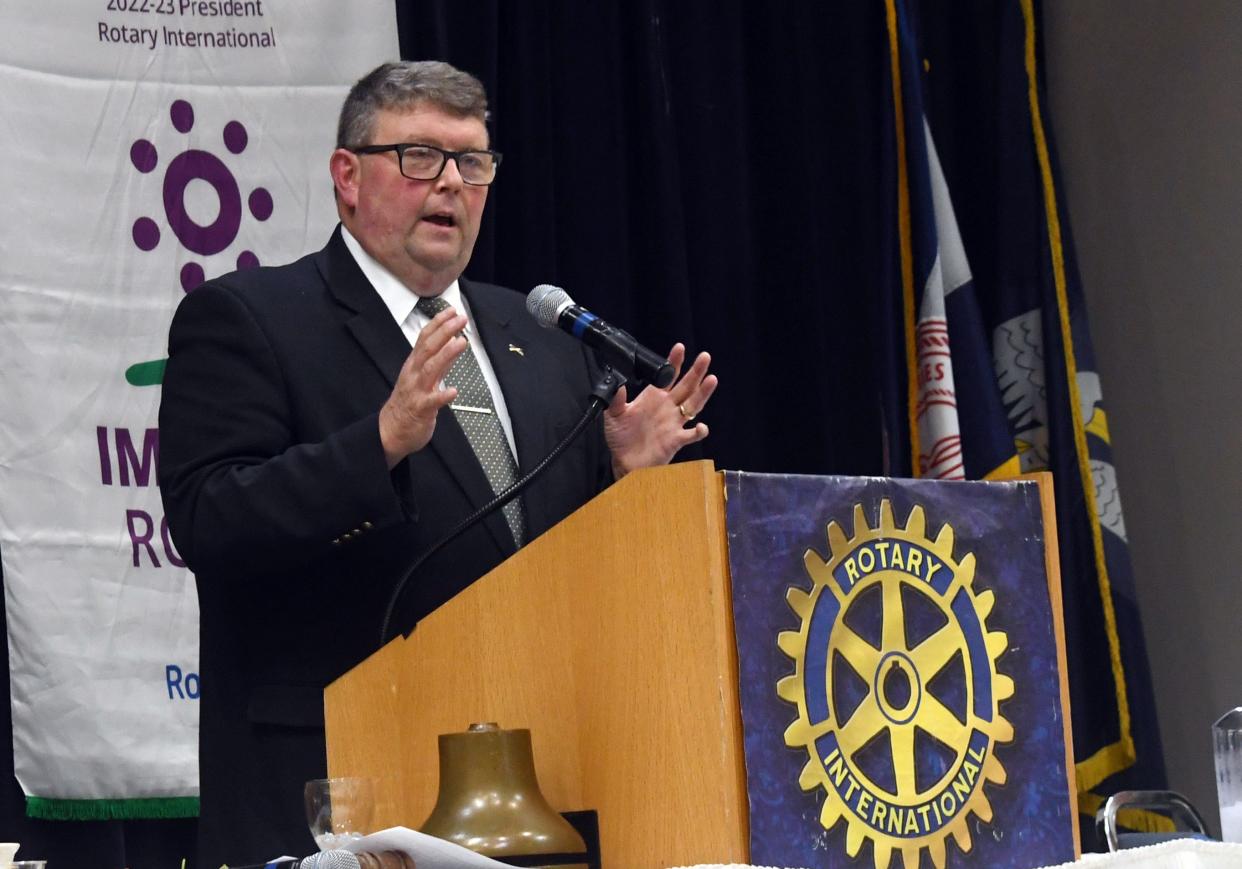Military museum curator shares history of all-Black tank battalion with Rotarians

The history of the all-Black 761st Tank Battalion was the topic guest speaker retired U.S. Army Capt. Richard Moran spoke about at the City of Alexandria’s Rotary meeting held Tuesday.
The 761st Tank Battalion was formed at Camp Claiborne in April of 1942 during World War II, said Moran who is the curator of the Louisiana Maneuvers & Military Museum at Camp Beauregard in Pineville. Their history is detailed in the book “Brothers in Arms.”
Moran showed a slide of two Army patches, one with a Black Panther. The 761st was known as the Black Panthers.
“The 761st Tank Battalion Independent was formed at Camp Claiborne in April 1942. The image they chose for their distinguished unit insignia or as everyone calls their unit crest was the Black Panthers that they saw on a tank destroyer patch,” said Moran. “Their motto was ‘Come out fighting.’ They contributed this to Joe Louis, the famous boxer.”
Many of the soldiers trained at Fort Knox, Kentucky, for 13 weeks before joining the rest of the battalion at Camp Claiborne, said Moran. At Camp Claiborne, they went through a rigorous training regiment to get to a high level of proficiency.
They then started training in 1943 with 85th Infantry division, the 93rd Infantry Division which was another Black unit, and the 100th Infantry Battalion at the 442nd Regimental Combat team. as part of the 3rd Army Louisiana Maneuvers. The unit then moved to Camp Hood and became “opposing forces” for the tank units rotating through the tank destroyer school. Soldiers of the other units gained much respect for the 761st because they proved to be worthy opponents.
At Camp Hood, a young Black 2nd lieutenant was assigned to the unit. That lieutenant was John Roosevelt Robinson.
“Better known as Jackie Robinson who would become the famous baseball player,” said Moran. “He trained at Fort Riley, not as tanker, but as a cavalry officer.”
His skill, determination and all the maneuver training he went through with the unit at Camp Claiborne made him a tanker one he was assigned a unit, he said.
“The real secret of why he was successful was he listened to his platoon sergeant who molded him into a great leader. So good that the battalion commander commended him on how good his platoon was,” said Moran.
The 761st drew attention from leadership throughout the Army. Brig. Gen. Ernest Dowling, commander of the Tank Destroyer Center, was the first to notice how good the unit was, said Moran.
They also caught the attention of Lt. Gen. Lesley McNair because of problems they were having in the European Theatre who said that they were needing reinforcements overseas because of the manpower shortage, he said. With 20 months of stateside training, the 761st was the best trained most capable armored tank battalion that wasn’t being used.
They deployed to the European Theater where they were assigned to Gen. George S. Patton’s Third Army. Patton told the unit that he didn’t care what color they were as long as they killed the Germans, said Moran. Patton went on to tell them that everyone had their eyes on them and are expecting great things from them and their race was looking forward to their success.
A Town Talk article from Feb. 3, 2023, “Marker honors Black soldiers of the 761st from Camp Claiborne who fought in World War II” quotes an information kiosk as saying, “Soldiers of the 761st fought through France, often at the leading edge of the advance. The unit endured 183 days of continuous operational involvement. In the final days of the war in Europe, the 761st was one of the first American units to reach the Steyr River in Austria.”
According to the article which quotes a historical marker at the site where Camp Claiborne once stood, "The 761st fought in the Battle of the Bulge, liberated over 30 towns and gained control of military bases in France, Belgium and Austria, all while “facing adverse weather conditions, difficult terrain, heavily fortified enemy positions, and extreme shortage of replacement personnel. The battalion's casualty rate was nearly 50%."
The article states that “the unit earned a Presidential Unit Citation, 11 Silver Stars, 70 Bronze Stars and 250 purple hearts, said Chavous. In 1997, Staff Sgt. Ruben Rivers was posthumously awarded the Medal of Honor for extraordinary heroism, Nov. 16-19, 1944.”
This article originally appeared on Alexandria Town Talk: Rotarians learn history of all-Black tank battalion at weekly luncheon

